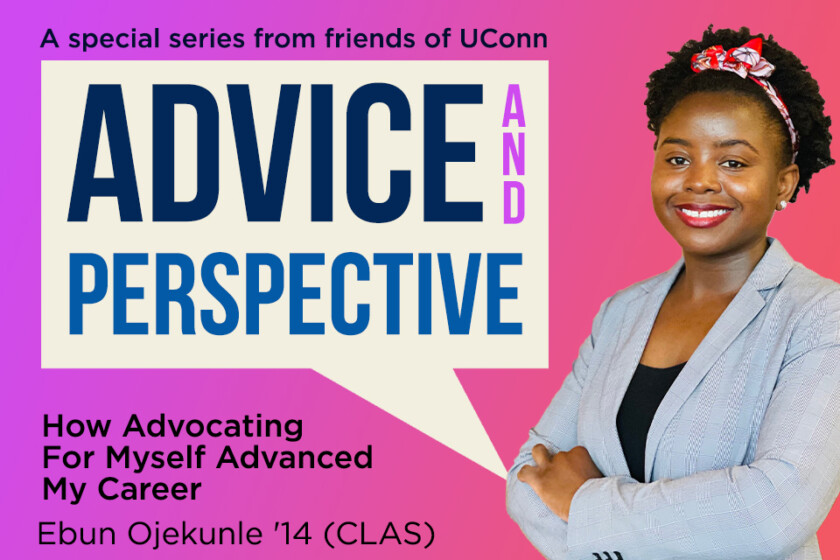
In career and life, one of the most important skills is advocating for ourselves. Yet, what does advocating for ourselves look like when it comes time to land research experience, negotiate a salary, or find a mentor? Ebun Ojekunle ’14 (CLAS) answered all these questions and more during her Advice and Perspective series: “How Advocating for Myself Advanced My Career.”
The first example Ebun gave was when she transferred to UConn and wanted to do undergraduate research. “I just went on the UConn chemistry website, looked through some of the work that professors we’re doing, and read about things that aligned with my interests,” says Ebun. “I emailed most of the professors … [one] professor was actually new to UConn at the time and had a meeting with me. He offered me the opportunity to do research work, and I was able to work in his lab for about two years.” All this happened after only two professors responded, and the first said research opportunities would only be available the following semester. Yet, Ebun persisted and was actually able to join research that semester through her own advocacy.
Of course, there’s always the risk that the other party isn’t receptive when advocating for ourselves. Ebun discussed how to manage this anxiety, advising students to “…not let the fear of rejection prevent [you] from taking a very important step in (your) career.” “While it could be nerve-wracking,” Ebun admits, “the more you (advocate for yourself), the more you’re going to get comfortable.” Not every ask will lead you to a “yes,” but, as Ebun explains, “if you don’t ask for it, then the answer is definitely no.”
Thankfully, there are numerous ways to increase your chance of getting a “yes.” The first way is to have a “specific ask.” Explain why you’re best suited for the opportunity you want. Explain how being given that opportunity would benefit the company as a whole. The second way is to “…be flexible.” “Sometimes when we get a response, it may not be (exactly what we want),” Ebun explains. Yet, she stresses that you can leverage whatever opportunity the other party gives you, even if it’s not exactly what you wanted, to gain experience. The third way is to be aware of “the way you ask.” Consider your audience, your timing, and your delivery before advocating for yourself.
This advocacy discussion also turned toward topics of identity and perspective. When it comes to professional relationships, Ebun says “…it is comfortable to connect with people who may look like us, (but) I’ve had relationships with people that don’t look like me.” It’s no so much about the shared identity between people as it is about their shared career goals. When advocating for yourself or finding mentors, stress to the other party how both of you can benefit professionally from the opportunity. This is a key skill in anyone’s career development, a skill that takes practice to develop. Indeed, Ebun says when she was negotiating her first job offer out of college, she “…practiced, practiced, practiced over and over again beforehand.” Practice advocating for yourself, too, and your career development will certainly accelerate.
Our full conversation with Ebun Ojekunle is available on our YouTube channel. Click the play button below to check it out!
